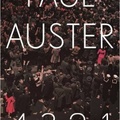Raymond Federman: Smiles on Washington Square

I first heard about Smiles on Washington Square in an American literature seminar at the university a couple of years ago. The novel seemed interesting, so when I found it in a second-hand book shop I bought it immediately but then put it aside without ever reading it. But now I was in the mood for something postmodern and this seemed like the ideal choice, and actually it turned out to be one.
Although the blurb of the Hungarian edition quite mercilessly tells the reader the whole “story”, I will not go into details. Suffice it to say that the novel tells the story of a love affair. The protagonists, Moinous and Sucette go through all the usual stages of an affair and we can follow them through their relationship from the first tentative glances and smiles until the bitter end.
But this is only the beginning, and in fact, the story is almost insubstantial, so it would not be worthwhile to read the novel just because of that, even less so because this is not the novel to get lost in: the author makes sure that the reader is aware that this is fiction, not the faithful depiction of reality.
What makes it worthwhile to read Smiles though is its style, its constant and very interesting shifts between past and present, its playfulness, its irony and the way it depicts the influence of reality, fiction and imagination on one another. For instance: Moinous and Sucette first meet at a rally on Washington Square, smile at each other but do not speak to each other. After the rally Sucette goes home and moulds the stranger with the nice smile into the autobiographic short story she is writing: she imagines that he must be French, she devises his whole past and personality and finally names him Moinous. And when Moinous and Sucette meet again in “reality”, the girl tells the boy about her short story, and Moinous says that he would go by the name of Moinous then, and would not tell Sucette his real name.
This is only one, quite simple example of how the novel blends together the different layers of reality, fiction, and reality within fiction. However, Federman goes even further than this: he puts the whole story into the conditional and makes the reader question the credibility of even the simplest of events. The only thing which is certain is the afternoon in March (or is it February?) when Moinous and Sucette first smile at each other then go ahead on their different ways.
By the way I think it is extremely clever and ironic that despite the emphatic fictitiousness, the pervasive feeling that perhaps nothing happened after all, and the constant shifts between past and present we still manage to learn every important (and sometimes quite unimportant) detail of the protagonists’ past, personality and the way their relationship develops: for example we know that at the beginning of their affair, Sucette was not willing to have sex with Moinous for 42 days; we see their first argument and also the birthdays they celebrate together.
It seems to me that Federman attempted to write an excessively textual text, and in the process he also created an absolutely banal, everyday love story the pieces of which he scattered here and there in the novel – but in case someone is only interested in the romantic story, they can easily find and put together the pieces, and ignore the irony.
It is because of novels like this that I love postmodern: Smiles on Washington Square gives the reader the freedom of several different interpretations, it reflects on the world and itself, it is very playful, seemingly simple, but in fact it demands great attention – and gives great delight in return.





